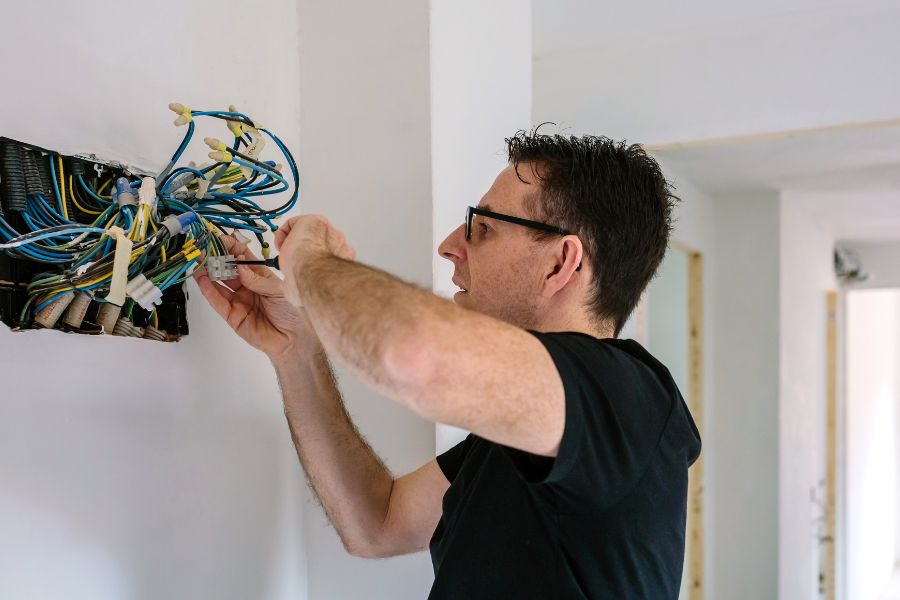
Assess your current electrical system by checking wiring, inspecting panels, testing outlets, evaluating lighting, and assessing system capacity. Plan for upgraded needs by identifying power-hungry appliances, anticipating tech changes, and designing for future demands. Hire a qualified electrician with proper licensing, references, detailed estimates, safety focus, and communication skills. Upgrade fixtures and outlets for safety and efficiency, including GFCIs, tamper-resistant outlets, LED lights, dimmable fixtures, and smart outlets. Ensure safety and compliance by inspecting for hazards, following NEC standards, upgrading panels, installing AFCIs/GFCIs, and replacing outdated wiring. Enhance safety, efficiency, and functionality in your home’s electrical system.
Assessing Your Current Electrical System
When evaluating your current electrical system, it is crucial to assess its safety, efficiency, and capacity to meet your household’s needs. Start by checking the condition of your wiring to ensure there are no exposed wires or signs of wear that could lead to electrical hazards. Inspect your electrical panels to see if they are up to date, properly labeled, and not overloaded. Test your outlets for proper grounding and functionality, making sure there are no signs of overheating. Evaluate your lighting fixtures to ensure they are energy-efficient and provide adequate lighting for your spaces.
Next, consider the capacity of your electrical system to handle your household’s current and future needs. Calculate the total electrical load of your appliances and devices to determine if your system has the necessary capacity. If you find that your system is frequently tripping circuit breakers or experiencing voltage drops, it may be a sign that an upgrade is needed to meet your demands. Conducting a thorough assessment of your current electrical system will help you identify any potential issues and determine if upgrades are necessary to improve safety and efficiency.
Planning for Upgraded Electrical Needs
To prepare for your home’s upgraded electrical needs, conduct a comprehensive assessment of your current power consumption and future requirements. Begin by identifying all the electrical appliances and devices in your home that consume significant amounts of power. This includes HVAC systems, kitchen appliances, entertainment systems, and lighting fixtures. Take note of their power ratings and usage patterns to gauge your overall electricity usage accurately.
Next, consider any upcoming changes or additions to your household that may impact your electrical needs. For instance, if you plan to install an electric vehicle charging station, upgrade your kitchen appliances, or add a home office with multiple electronic devices, these factors will influence your future power requirements.
Additionally, think about potential advancements in technology that could affect your electricity usage, such as energy-efficient appliances, smart home devices, or home automation systems. Anticipating these developments will help you design an electrical system that can accommodate both your current and future needs seamlessly.
Hiring a Qualified Electrician
For optimal safety and efficiency in your home’s electrical system upgrade, selecting a qualified electrician is paramount. When hiring an electrician, look for someone with proper licensing and insurance to ensure they meet industry standards and regulations. A qualified electrician will have the expertise to assess your home’s electrical needs accurately and recommend the best solutions for your specific requirements.
Before hiring an electrician, ask for references or check online reviews to gauge their reputation and reliability. A trustworthy electrician will provide a detailed estimate outlining the scope of work, timeline, and cost involved. Communication is key, so ensure the electrician is responsive to your inquiries and concerns throughout the project.
Additionally, a qualified electrician will prioritize safety measures, such as using proper equipment and following all necessary precautions to prevent accidents or hazards. By hiring a skilled professional, you can have peace of mind knowing that your home’s electrical system is in good hands.
Upgrading Electrical Fixtures and Outlets
Consider upgrading your home’s electrical fixtures and outlets to enhance safety and efficiency. Upgrading to modern fixtures and outlets can not only improve the aesthetics of your home but also ensure that your electrical system is up to date and functioning optimally. Start by replacing old, worn-out outlets with newer models that have built-in safety features like ground fault circuit interrupters (GFCIs) to protect against electrical shock. Consider upgrading to tamper-resistant outlets to protect children from electrical hazards.
When it comes to light fixtures, switching to energy-efficient LED options can help you save on energy costs in the long run. Additionally, upgrading to dimmable fixtures gives you more control over the lighting in your home and can create a more comfortable ambiance. Installing smart outlets and fixtures that can be controlled remotely via your smartphone adds convenience and allows you to monitor and manage your energy usage more effectively. Upgrading your electrical fixtures and outlets is a worthwhile investment that can enhance both the safety and efficiency of your home.
Ensuring Safety and Compliance
Enhance the safety and compliance of your home’s electrical system by conducting thorough inspections and implementing necessary upgrades. Begin by examining your current electrical setup to identify any potential hazards or code violations. Look for signs of wear and tear on wires, outlets, and switches, and check for proper grounding and bonding. Ensure that all electrical work in your home meets the National Electrical Code (NEC) standards to guarantee safety and compliance.
Consider upgrading your electrical panel to accommodate modern power demands and ensure that it can handle the load without overheating. Install arc-fault circuit interrupters (AFCIs) and ground-fault circuit interrupters (GFCIs) to protect against electrical fires and shocks. Replace outdated or damaged wiring with new, insulated wires to prevent shorts and electrical malfunctions.
Consult with a qualified electrician to address any issues and make the necessary upgrades to enhance the safety and compliance of your home’s electrical system. Prioritize safety to protect your family and property from electrical hazards.










